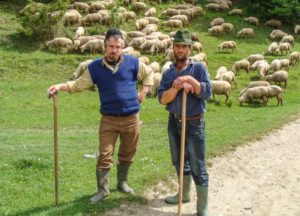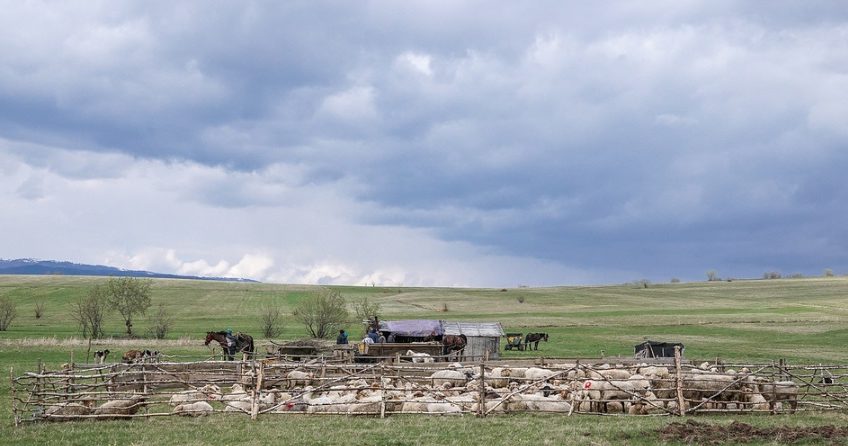By Paul White
The following is an excerpt chosen by the Vostokian staff. For the original article with information on transhumant shepherds and more on Transylvania’s environment, visit Paul’s blog, Wild Transylvania.
“Transhumance has been practised in Transylvania for more than a thousand years, supported by tried and tested methods of pastoral animal husbandry. A high level of supervision is required by both shepherds and dogs to protect grazing flocks from depredation by brown bears and wolves that roam across the Carpathian mountains. Local transhumant shepherds have taught me some valuable lessons in conservation who view the mountains and forests as their bread basket, something to be nurtured and cared for, as without it they are fully aware their traditional way of life would soon end. They see the wolves and brown bears as part of that environment and believe that they have equal right to be there. When sheep and goats are taken, they don’t call for predators to be culled as they expect some losses throughout the year. They may not be aware of it but these pastoral shepherds best demonstrate the harmony that is possible between humans, wildlife, and environment.
Traditional transhumant shepherding of this kind is rarely seen in Western Europe, requiring tough and hardy characters to protect their livestock from bears and wolves from early spring to late autumn. They move through forest covered mountains to open clearings rich in grass and meadow flowers. Once grazed the shepherds move on leaving the meadow layered with droppings fertilizing the soil ready for fresh growth. The meat, milk, and cheese produced from this chemical-free grazing are delicious and truly organic. Good quality food production in harmony with the environment is not a new concept as these shepherds and their ancestors have aptly proved. It took me several years of observation and documentation to fully understand this truly refined system, the way it all works and the way it is designed to coincide with the seasons. Nothing is wasted and the footprint the shepherds leave behind is minimal.

When I was first introduced to transhumance in Romania I was surprised to discover that after milking the sheep, the cheese was made immediately after in temporary wooden sheds. This end product is not “treated” with chemicals, pasteurised or refined in any way. Unfortunately, this is unacceptable to the bureaucrats in Brussels and a raft of EU regulations have been imposed on these pastoral shepherds since Romania joined the European Union. Much higher standards of hygiene and packaging are now required which are simply unaffordable for most shepherds, hence their rapid decline in numbers. This is an unfathomable state of affairs to local villagers that have thrived on this food for generations. If anything, the natural microbes found in this cheese actually stimulates the immune system. I believe that if over-regulation is allowed to destroy this way of life, we will lose some of the most culturally diverse customs and people that still exist on the fringes of “civilized” Europe.”
Additional notes by Hristo Voynov, Deputy Editor in Chief at The Vostokian:
The cultural heritage of this lifestyle is one which is slowly disappearing and cannot be easily replaced after it is forgotten. While the EU has given many benefits to its constituents, over-regulation has also complicated the lives of pastoral and subsistence farmers who have maintained their way of life for many generations. Recently, Penka the cow became a celebrity because she crossed the border from Bulgarian into Serbia and was denied reentry, the reason being that she might have caught diseases that could then be spread within the EU. She was almost executed for her crime. Not all have been spared, as fear of the ‘sheep and goat plague’ has resulted in the quick execution of many Bulgarian animals before alternatives could be considered and with little compensation for the people that lost their livelihoods.
While the spread of disease is an important risk, it is foolish to assume that diseases can be easily stopped by man-made borders, or that a land that has been free of such borders for most of its history will be better off with strict rules as to what can and cannot have free movement. Finding a middle ground is not impossible, as exceptions to certain rules can be made. In the U.S., Native Americans have special licenses to allow them to freely hunt as they did for centuries before hunting became regulated, allowing them to maintain their culture and lifestyle in the face of modernization. One country’s laws are not always applicable to others, but this isn’t a matter of legal imperialism. Quite the opposite, such laws should be done to keep dying traditions alive and ensure that regulations aren’t choking off the people that they are meant to help.


0 comments